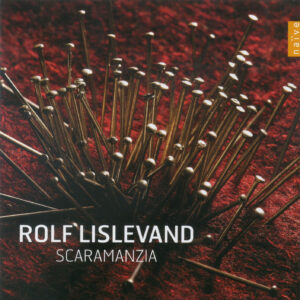“Scaramanzia” is an Italian term that alludes to irrational ways one can either avoid bad luck themselves, or inflict it on others. In the notes to this new recording, Rolf Lislevand cites superstition and malediction as primary examples, explaining that all varieties of “scaramanzia” rely on the repeating of rituals in one form or another. He then links this behavioral repetition with the Italian term ostinato, derived from the English “stubborn” or “obstinate”, where a musical motif, phrase, melodic theme, etc., is persistently repeated. As Lislevand puts it, for this program they “went in search of the ostinato as a means of expression, as a musical form, and as a minimalist rhetorical and ritual phenomenon.”
Nearly all of the selections here are duets featuring Lislevand accompanied by Thor-harald Johnsen performing on baroque guitars, chitarra battente (Italian “strumming guitar”), and lute, with additional support by Bjorn Kjellemyr on colascione (a member of the lute family with an extremely elongated neck and a small body) and Ulrik Gaston Larsen on an additional baroque guitar and theorbo. These mostly early baroque works typically begin simply enough, then gradually evolve into more complex counterpoint and sonority, often leading to dazzling conclusions.
In Antonio Carbonchi’s Capona, for instance, it’s fascinating how Lislevand begins the piece by sustaining the notes with a sitar-like dexterity before Johnsen enters, introducing dance elements that both rhythmically complement and at times contrast with Lislevand’s treatment. Later on Domenico Pellegrini’s Passacagi per tutte le Lettere is laced with similar intricacies, though here an additional intrigue is created, a sense of madness by the way Lislevand and Johnsen radically shift the dynamics and rhythmic patterns in unison throughout the piece. Apart from the Tarantella, it’s the lengthiest work here and also one of the most beguiling.
Though the booklet lists its timing as 1:05, the performance of the Tarantella is actually 10:05, the longest selection on the program. Lislevand and Johnsen’s arrangement of this traditional southern Italian dance, while instrumentally sparse compared to most, is nonetheless just as mesmerizing and compelling as any. Again, Lislevand and Johnsen’s deft articulation and the manner in which they shift the dynamics and momentum throughout the piece is remarkably effective and continuously captivating.
The sound is audiophile quality with excellent clarity and detail. There are a few moments, most notably in the previously mentioned Capona and Corbetta’s Passacaille, where Lislevand’s breathing and sighs can be distinctly heard, but it’s nothing compared to the distracting sounds that marred his earlier 2003 effort, “La Belle Homicide”, previously reviewed here. All in all, an intelligently conceived, expertly performed, ravishing program, and in turn, highly recommended.
































